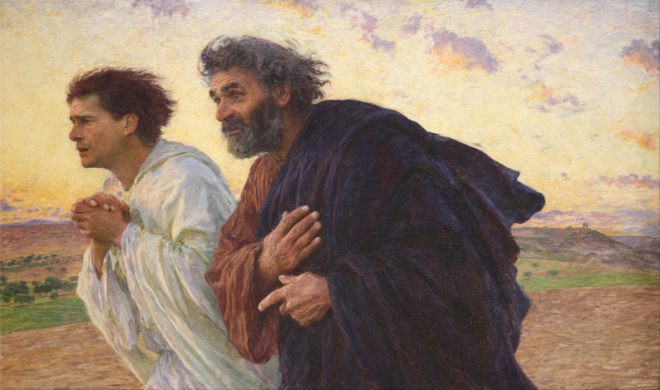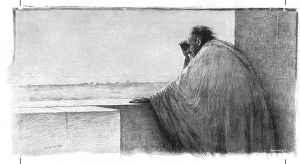Parable of the Prodigal Son
(Luke 15:11-32)
Jesus said, “There was a man who had two sons. The younger of them said to his father, ‘Father, give me the part of the estate which falls to me.’ So his father divided his living between them. Not many days after, the son realized it all and went away to a far country, and there in wanton recklessness scattered his substance. When he had spent everything a mighty famine arose throughout that country and he began to be in want. He went and attached himself to a citizen of that country, and he sent him into his fields to feed pigs; and he had a great desire to fill himself with the husks the pigs were eating; and no one gave anything to him. When he had come to himself, he said, ‘How many of my father’s hired servants have more than enough bread, and I—I am perishing here with hunger. I will get up and I will go to my father, and I will say to him, “Father, I have sinned against heaven and before you. I am no longer fit to be called your son. Make me as one of your hired servants.”‘ So he got up and went to his father. While he was still a long way away his father saw him, and was moved to the depths of his being and ran and flung his arms round his neck and kissed him tenderly. The son said to him, ‘Father, I have sinned against heaven and before you. I am no longer fit to be called your son.’ But the father said to his servants, ‘Quick! Bring out the best robe and put it on him; put a ring on his finger; put shoes on his feet; and bring the fatted calf and kill it and let us eat and rejoice, for this my son was dead and has come back to life again; he was lost and has been found.’ And they began to rejoice.
“Now the elder son was in the field. When he came near the house he heard the sound of music and dancing. He called one of the slaves and asked what these things could mean? He said to him, ‘Your brother has come, and your father has killed the fatted calf because he has got him back safe and sound.’ He was enraged and refused to come in. His father went out and urged him to come in. He answered his father, ‘Look you, I have served you so many years and I never transgressed your order, and to me you never gave a kid that I might have a good time with my friends. But when this son of yours—this fellow who consumed your living with harlots—came, you killed the fatted calf for him.’ ‘Child,’ he said to him, ‘you are always with me. Everything that is mine is yours. But we had to rejoice and be glad, for your brother was dead and has come back to life again; he was lost and has been found.'”**
Not without reason this has been called the greatest short story in the world. Under Jewish law a father was not free to leave his property as he liked. The elder son must get two-thirds and the younger one-third. (Deut 21:17.) It was by no means unusual for a father to distribute his estate before he died, if he wished to retire from the actual management of affairs. But there is a certain heartless callousness in the request of the younger son. He said in effect, “Give me now the part of the estate I will get anyway when you are dead, and let me get out of this.” The father did not argue. He knew that if the son was ever to learn he must learn the hard way; and he granted his request. Without delay the son realized his share of the property and left home.
He soon ran through the money; and he finished up feeding pigs, a task that was forbidden to a Jew because the law said, “Cursed is he who feeds swine.” Then Jesus paid sinning mankind the greatest compliment it has ever been paid. “When he came to himself,” he said. Jesus believed that so long as a man was away from God he was not truly himself; he was only truly himself when he was on the way home. Beyond a doubt Jesus did not believe in total depravity. He never believed that you could glorify God by blackguarding man; he believed that man was never essentially himself until he came home to God.
So the son decided to come home and plead to be taken back not as a son but in the lowest rank of slaves, the hired servants, the men who were only day labourers. The ordinary slave was in some sense a member of the family, but the hired servant could be dismissed at a day’s notice. He was not one of the family at all. He came home; and, according to the best Greek text, his father never gave him the chance to ask to be a servant. He broke in before that. The robe stands for honour; the ring for authority, for if a man gave to another his signet ring it was the same as giving him the power of attorney; the shoes for a son as opposed to a slave, for children of the family were shod and slaves were not. (The slave’s dream in the negro spiritual is of the time when “all God’s chillun got shoes,” for shoes were the sign of freedom.) And a feast was made that all might rejoice at the wanderer’s return.
Let us stop there and see the truth so far in this parable.
(i) It should never have been called the parable of the Prodigal Son, for the son is not the hero. It should be called the parable of the Loving Father, for it tells us rather about a father’s love than a son’s sin.
(ii) It tells us much about the forgiveness of God. The father must have been waiting and watching for the son to come home, for he saw him a long way off. When he came, he forgave him with no recriminations. There is a way of forgiving, when forgiveness is conferred as a favour. It is even worse, when someone is forgiven, but always by hint and by word and by threat his sin is held over him.
Once Lincoln was asked how he was going to treat the rebellious southerners when they had finally been defeated and had returned to the Union of the United States. The questioner expected that Lincoln would take a dire vengeance, but he answered, “I will treat them as if they had never been away.”
It is the wonder of the love of God that he treats us like that.
That is not the end of the story. There enters the elder brother who was actually sorry that his brother had come home. He stands for the self-righteous Pharisees who would rather see a sinner destroyed than saved. Certain things stand out about him.
(i) His attitude shows that his years of obedience to his father had been years of grim duty and not of loving service.
(ii) His attitude is one of utter lack of sympathy. He refers to the prodigal, not as any brother, but as your son. He was the kind of self-righteous character who would cheerfully have kicked a man farther into the gutter when he was already down.
(iii) He had a peculiarly nasty mind. There is no mention of harlots until he mentions them. He, no doubt, suspected his brother of the sins he himself would have liked to commit.
Once again we have the amazing truth that it is easier to confess to God than it is to many a man; that God is more merciful in his judgments than many an orthodox man; that the love of God is far broader than the love of man; and that God can forgive when men refuse to forgive. In face of a love like that we cannot be other than lost in wonder, love and praise.
The Gospel of Luke, Barclay’s Daily Study Bible (NT).
** William Barclay’s translation.





Reblogged this on St. John One: One.
LikeLike